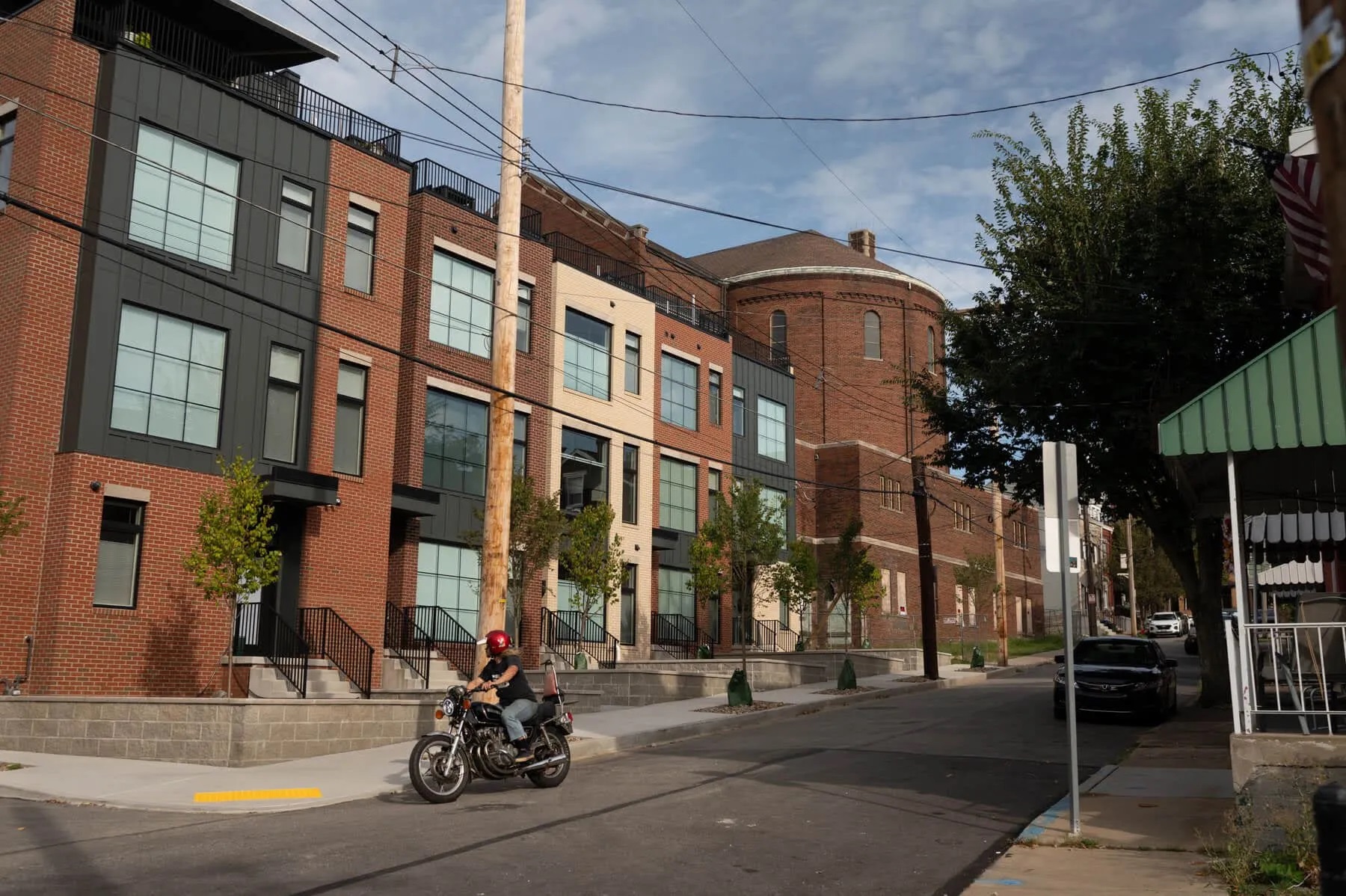Townhouses at 43rd and Summit streets in Lawrenceville beside the Holy Family Church on Monday, Sept. 16, 2024. Still under construction, the development will include five inclusionary units. (Photo by Stephanie Strasburg/PublicSource)
Mayor Ed Gainey’s proposal to loosen numerous housing zoning rules while demanding more affordable units citywide led one commissioner to ask for a holistic approach.
“PublicSource is an independent nonprofit newsroom serving the Pittsburgh region. Sign up for our free newsletters.”
The mayor on Sept. 5 announced a push for several measures meant to address the affordability issues outlined in a 2022 housing needs study. Gainey looks to expand transit-oriented development, allow accessory dwelling units, remove some parking requirements and minimum lot sizes and expand inclusionary zoning throughout the city. The process of enacting those measures began Tuesday with a City Planning Commission briefing. The reforms will get a commission hearing and vote later this year and City Council will have final word.
The city currently has inclusionary zoning contained to the neighborhoods of Polish Hill, Bloomfield, Lawrenceville and most of Oakland. Under inclusionary zoning, developers must set aside 10% of total units being built for households making no more than 50% of the area median income [AMI]. The rule applies to projects including 20 or more dwelling units, exempting dormitories.
Gainey is looking to break inclusionary zoning out of its containment despite a pending lawsuit filed by the Builders Association of Metropolitan Pittsburgh challenging the rules.
Andrew Dash, the deputy director of the Department of City Planning, presented the plans to the commission, explaining that the administration’s proposal “comes from 2021 work which led to updates in the housing needs assessment in 2022.”
Dash said the proposals are being presented to the commission “in chunks” to prevent overwhelming the panel. The city will use any feedback to advance amendments related to the overall effort.
Dash said the housing needs assessment showed that the gap between the affordable housing supply and demand shrunk since 2016, “but not for good reasons.”
He explained that while incomes in the city are rising faster than rents, many people can’t afford to live within city limits, prompting lower-income households to leave.
“Low-income renters were most vulnerable and were being lost from the city into surrounding suburbs and outside Pittsburgh altogether,” Dash said.
Along with expanding inclusionary zoning, the administration wants to remove the minimum lot size per unit and reduce the minimum lot size requirements for housing construction. Doing this, according to the administration’s presentation to the commission, would allow for the creation of more multi-unit developments. These reforms would not change height and setback requirements currently in place.
Dash said that most of these reforms target districts zoned for high density, but the city eventually plans to reform rules for lower-density residential districts, too.
Commissioner Rachel O’Neill expressed concern that the proposed changes would unfairly leave wealthier parts of the city untouched.
“We need to look at this more holistically than just areas that include larger lot sizes,” she said.
Downtown office to residential conversion
The commission also previewed plans to turn an eight-story office building on Penn Avenue, Downtown, into a residential building with retail on the ground floor.
Joseph Fraker, an urban planner with the city, presented the plans and noted the project is in a historic district.
The project proposed by iPenn Ventures calls for the demolition and replacement of the building’s facade and includes 70 housing units, 10 to be set aside for people making 50% of AMI and who have a Housing Choice Voucher.
Attorney Jonathan Kamin, representing iPenn, said that the building was originally part of “a much larger building. And then there was fire and part of it was demolished. What we’re left with is trying to convert an office building into an apartment building.”
The plans call for a deck and for opening the eastern and western facades up to install windows.
“We hope to have a food service tenant to activate the street and the side lot for space to eat outdoors,” Kamin said, plus “walkways and lounging with seating under umbrellas and trellis.”
Brett Walsh, of iPenn, said that the affordable housing component comes from a tax discount received in exchange for locking in affordable housing for a 10-year period.
Commissioner Holly Dick asked about accessibility throughout the apartments and planned retail.
“We’re going to exceed [Americans with Disabilities Act] code requirements but we don’t know yet what that number is” of accessible units, Walsh said, adding that he thought the city was undersupplied when it came to ADA units.
Commissioner Steve Mazza said he was thoroughly disappointed in the company’s decision to use a demolition contracting company that is not part of Pittsburgh’s Workforce Development Hub. The Hub is a federal initiative meant to help train people in the Pittsburgh region for unionized, skilled trades and is specifically targeted towards residents of “high/extreme needs neighborhoods.”
“We’re trying to change our city into a model of helping people and this is very disappointing,” Mazza said. “We’re trying to build generational wealth and we have a developer think, like, ‘Well we don’t need those things,’ when we actually do.”
“Developers come to our town, use our tax dollars and don’t use our city of Pittsburgh workers,” Mazza said. “It’s not a good look and Pittsburgh taxpayers shouldn’t appreciate this.”
Walsh asked Mazza whether he considered the company they’re using, Franjo Construction, to be a city contractor. Franjo is based in Homestead.
But Chairwoman LaShawn Burton Faulk put an end to what she called the “back and forth.” A commission hearing and vote could come Oct. 1.
Eric Jankiewicz is PublicSource’s economic development reporter, and can be reached at ericj@publicsource.org or on Twitter @ericjankiewicz
This article first appeared on PublicSource and is republished here under a Creative Commons license.
